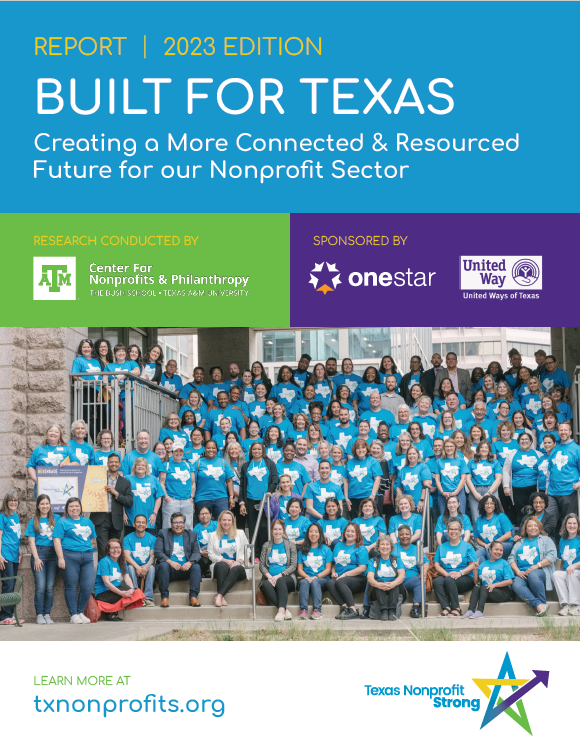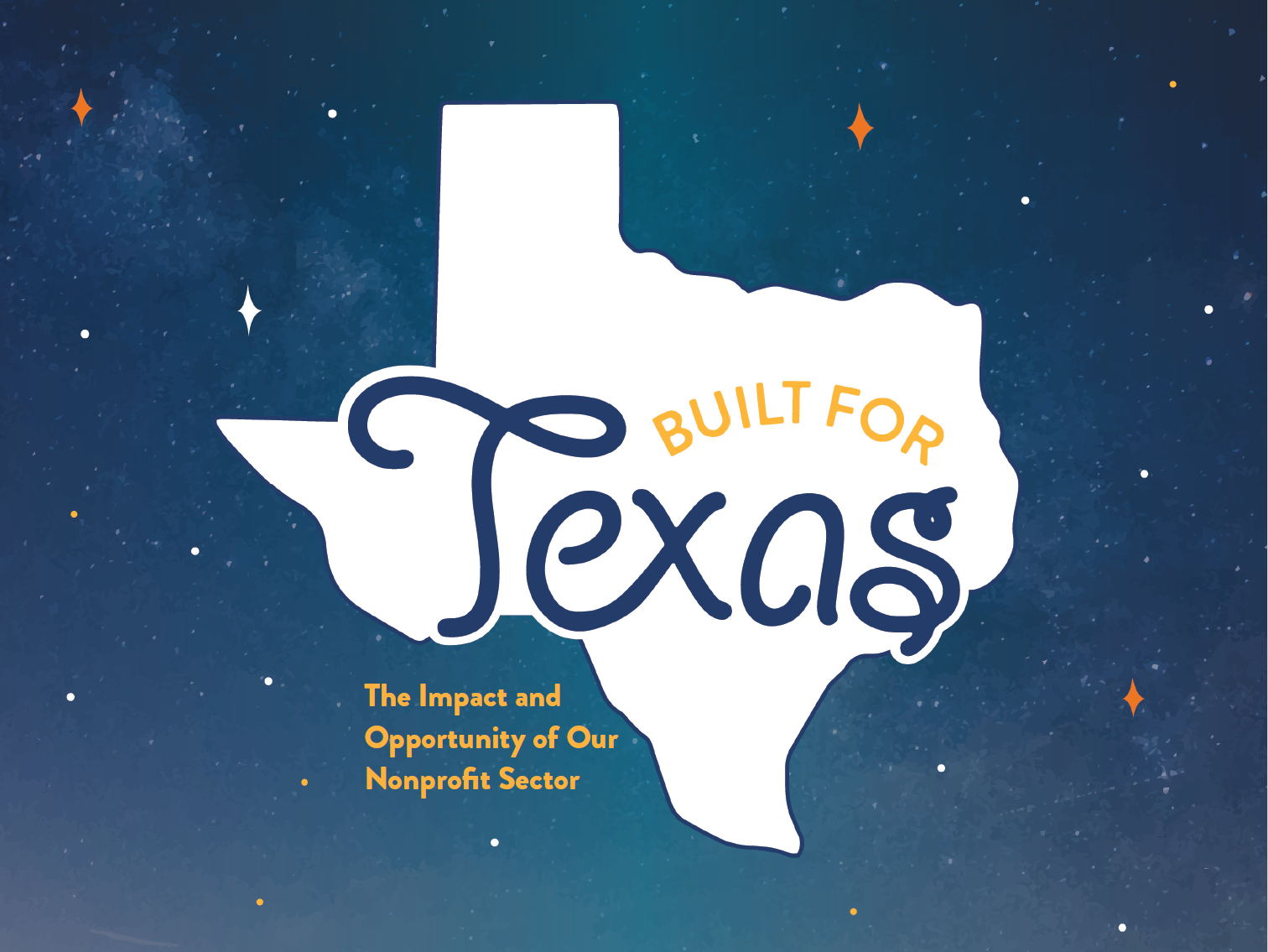Built for Texas: Creating a More Connected & Resourced Future for our Nonprofit Sector
October 2023
The 2023 edition of Built for Texas: Creating a More Connected & Resourced Future for our Nonprofit Sector explores the continued growth of the state’s nonprofit sector and the importance of collaboration amid increasingly limited resources.
We believe that a robust nonprofit sector is essential for strong and vibrant communities. For all participants in the social impact ecosystem—whether donors, nonprofit professionals, lawmakers, or funders—we are asking the question, “How can I continue to help the communities I care about in an era of rapid change?”
This publication is our answer and, we hope, a guide for you. The report is presented in three parts: an executive summary featuring high-level insights, a deeper dive into findings, and tools and suggested actions by audience.
Correction: The data in the Where are Texas Nonprofits? graphic displayed in the Built For Texas report and toolkit were updated as of March 2024. Past versions of the report and toolkit contained a graphic with incorrect 2022 data.
Key Findings
Between 2015 and 2022, the Texas nonprofit sector grew by 22%. There are currently more than 130,000 nonprofits across the state of texas.
Why it matters: The Texas nonprofit sector is expanding at an exponential rate, nearly doubling in size every decade for the past 30 years. Nonprofits in the areas of Human Services and Education have seen the most pronounced growth over the last eight years. While more nonprofits can be a powerful solution to ever-growing community challenges, this proliferation also points to a need for thoughtful collaboration and partnership to avoid duplication of services and unnecessary competition for resources.
Despite its 22% growth, the nonprofit sector’s total revenue grew by only 13% across the state. Revenue growth varies greatly by region and by type of nonprofit.
Why it matters: Financial support for nonprofits has lagged behind the rapid growth of sector, leading to increased competition for funding. Through collaboration and partnership, nonprofits can find efficiencies, avoid duplication of efforts, and spark innovation to ensure long-term sustainability of the sector. Funders can also play a role by creating more opportunities for unrestricted funding that allows nonprofits to better adapt to rapidly evolving community needs and exercise creativity and innovation.
More than 75% of Texas counties are considered rural.
Why it matters: Typical rural nonprofits are older and hold more assets than their urban counterpart, but rural organizations receive less revenue each year than nonprofits in metropolitan areas. For every dollar in revenue the rural nonprofit sector receives only nine cents. While the rural nonprofit may have more assets, they receive less incoming funding.
Built for Texas: The Impact and Opportunity of Our Nonprofit Sector
November 2019
The report Built for Texas: The Impact and Opportunity of Our Nonprofit Sector serves as a vehicle to unite, rally, and strongly articulate the added value—as well as the capacity limitations—of the overall sector. The data and findings in Built for Texas contribute to a fuller, more informed understanding of the nonprofit sector in Texas and its contribution to the state’s economy. Built for Texas incorporates simple yet specific calls to action to magnify the contributions and potential of Texas nonprofits.
Summarized below are key report findings, each paired with a case for underscoring why the said finding matters. This structure is intended to provoke discussion on the value and current capacity of Texas nonprofits.
Key Findings
In 2018, there were almost 110K (or 106,764) Texas nonprofit organizations registered with the Internal Revenue Service (IRS) – in the past decade, the Texas nonprofit sector has more than doubled – the number of nonprofits in Texas is growing by almost 10% per year.
Why it matters: The sector has an eminently Texan approach – with local voices, local knowledge, local values, local leadership, and local solutions driving nonprofit work. As mission-driven organizations governed by community leaders, nonprofits have the flexibility and entrepreneurial capacity to respond to changes in our
Texas landscape.
Nonprofits are integral to how communities solve problems as nonprofits rely on Texans to donate their time and services as volunteers.
Why it matters: Nonprofits are often more nimble and cost-effective in responding to community needs as they are able to leverage significant volunteer hours and private donations – something government can’t do. While the rate of volunteering in Texas was at pace with the whole nation in 2002, both the Texas and national rates of volunteers giving their time and talent to nonprofits have declined since then. As charitable activity, volunteering and donations decline, it is critical to find new ways to support the nonprofit sector.
The economic benefits from the ongoing operations of Texas nonprofits include $1 out of every $16 ($216.6 billion) in annual expenditures and $1 out of every $13 ($110 billion) in annual gross product.
As an example, Texas nonprofit hospitals lead gains to business activity across Texas of $43.5 billion in gross product per year and 526,788 jobs, when multiplier effects are included, with $85.9 billion in total expenditures.
Why it matters: Contributing to the overall financial health of the Texas economy, nonprofits demonstrate and exemplify the potential to bring in money (or keep money from leaving the state), provide jobs and wages to Texans, and circulate money in the economy through their purchases of goods and services.
1 in 8 Texas (private) jobs are in or tied directly to the nonprofit sector.
Why it matters: With 1.4 million employees and nonprofits contributing to every one of Texas’ major industries, nonprofits have a significant influence on local economies.
Nonprofits leverage $4.89 billion of government and private donation dollars to help bridge the gap for Texas’ needs.
Why it matters: Nonprofits are critical partners with government in ensuring the prosperity and vitality of Texas. Nonprofit missions are complementary to the goals of government. Without the essential infrastructure of the nonprofit sector, government would need to increase taxes in order to provide the range of services and innovative solutions to communities needs that Texas nonprofits efficiently provide.
Texas nonprofits move beyond ‘charity’ and contribute to every one of Texas’ major industries. They also have the ability to experiment and innovate, finding solutions to pressing social problems.
Why it matters: The sector’s reach is wide representing a diversity of organizations who represent a cross of all industries. Together, Texas nonprofits unite around a common purpose: advance the common good for Texans.
Did You Know Texas Nonprofits...?


